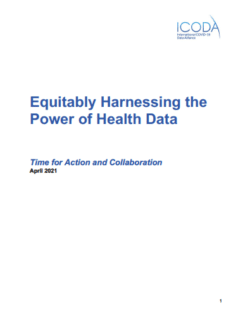The Equitably Harnessing the Power of Health Data: Time for Action and Collaboration Report has been a collaborative effort inspired by a symposium organised by the International COVID-19 Data Alliance (ICODA) in partnership with The Global Health Network (TGHN) as part of the Consortium of Universities for Global Health (CUGH) March 2021 Virtual Conference Addressing Critical Gaps in Global Health and Development.
We have summarised the key themes from the report below:
The financial, human and infrastructural barriers to research must be overcome
The lack of financial, human and infrastructural resources are among the greatest barriers research and all inhibit advances in care. In some cases it is essential to develop stronger relationships with policymakers and political representatives to persuade them of the benefits of evidence-based healthcare.
Research must be local, global – ubiquitous – to mitigate future health emergencies
All countries need a robust research infrastructure with sufficient resources, skills and capacity. This is essential for tackling the everyday health challenges of their local populations. It is equally necessary for ensuring that there is a worldwide system able to swiftly identify and respond to emergent pathogens. Only by investing in the day-to-day can we be ready to stand up to the great challenges of tomorrow.
With a worldwide network of teams able to immediately pivot their focus to characterise and learn about new threats, rapidly sharing the data, it is more likely that we can stop a localised outbreak becoming an international emergency.
At the same time, the potential of health data research can only be fully realised by building strong and inclusive international networks, alliances and collaborations. Each must be able to access and work on data across and between all partners, geographies and diseases.
High quality data is the essential foundation for high quality healthcare
High quality care is underpinned by high quality data. Studies need to be well designed and executed by suitably-trained researchers gathering information from all relevant sections of the community. In many parts of the world there is a need to build capacity, developing lasting and capable teams.
All roles engaged in healthcare delivery can be supported in undertaking research where good questions can be set to gain vital evidence and working closely with the local community to ensure relevant new treatments and practice in every setting.
Communities must be at the heart of everything we do
Research must be of social benefit and yield improvements in health and care. This can only happen if research is embedded within healthcare systems and communities, identifying their needs and carrying out research that tackles those needs. Not only do communities have to be central to the research process but they must also be part of the whole cycle to ensure they benefit from the results of the findings and ensure that the ensuing recommendations are implemented to deliver better care.
Ethical standards, trustworthy behaviour and fair sharing are essential at all stages
Harnessing the potential of health data and guaranteeing equity requires a fair, balanced and trusted research eco-system. The current pandemic and previous crises have shown the need for close collaboration on research and the open, fair sharing of results and the benefits of research. Without ethics, fairness and trust at every stage there is a risk to future co-operation.
Ethical standards and effective governance are needed at all stages of the research cycle in order to build public trust, and trust between countries and institutions. Progress can be made through commitments to open science and the transparent stewardship of data. These are areas in which governments, donors and research bodies have an important role to play.
Public trust is equally important. If science and research are to be valued and trusted by society not only must the public be directly involved at all stages but they must have confidence that all health data is being managed and exploited for the individual and collective benefit.
We must learn from experience and from each other
The response to COVID-19 has often been deeply flawed, partly because of a failure to learn lessons from past major disease outbreaks. There have, though, been many examples of outstanding excellence in health data science research that can be built on and adapted in new locations and circumstances. COVID-19 must be treated as a call to sustained action to engage and to realise our potential so we are better prepared for future pandemics and health challenges.
Download the Equitably Harnessing the Power of Health Data report
Speakers and contributors included:
Dr Michael Makanga, Chief Executive Officer of the Association Secretariat, European and Developing Countries Clinical Trials Partnership (EDCTP)
Prof Trudie Lang, Director of The Global Health Network
Prof Andrew Morris, Chair of ICODA and Director of HDR UK
Dr Aliya Naheed, Head, Initiative for Non-Communicable Disease, Health Systems and Population Studies Division, ICDDR,B, (Bangladesh)
Dr Jackeline Alger, Faculty Member of the Faculty of Medical Sciences, Universidad Nacional Autónoma de Honduras (UNAH)
Dr David Mukanga, Senior Program Officer (African Regulatory Systems) at the Bill & Melinda Gates Foundation
Dr Luiza Lourenco, REDe Regional Coordinator (Brazil), The Global Health Network
Dr Carla Saenz, Regional Bioethics Advisor, Department of Health Systems and Services, Pan American Health Organization
You can contact us with any queries or comments, and follow us on Twitter, LinkedIn or Facebook for ICODA’s latest news.
